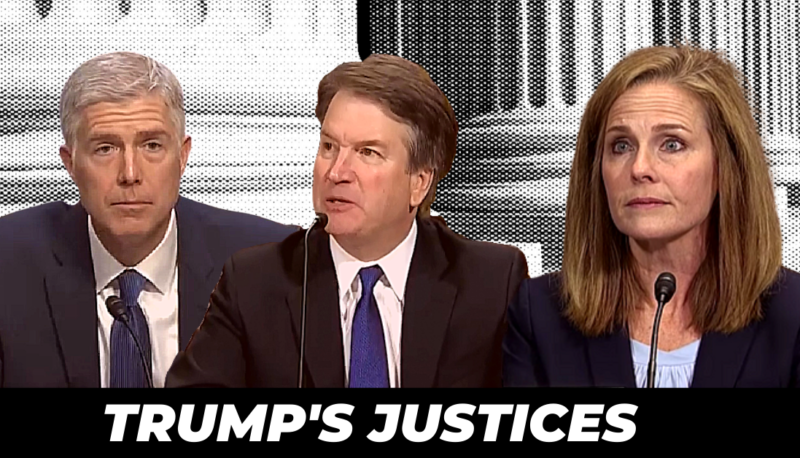“Confirmed Judges, Confirmed Fears” is a blog series documenting the harmful impact of President Trump’s judges on Americans’ rights and liberties. Cases in the series can be found by issue and by judge at this link.
Trump justices Brett Kavanaugh, Neil Gorsuch, and Amy Coney Barrett cast deciding votes in a 6-3 decision to reverse a lower court and ruled that the government can indefinitely detain refugees, who are seeking through sometimes lengthy proceedings to avoid being returned to their home countries because of a reasonable fear of torture or persecution, without even a bond hearing. The June 2021 decision was in Johnson v Guzman Chavez.
As explained in an earlier decision in the case when it was in the lower courts, Maria Angelica Guzman Chavez and eight other individuals were deported from the US to their home countries in South and Central America, where they contended that they faced “death threats” and other actual or threatened “persecution or torture” endangering them. “Fearing for their safety,” they returned to the US without legal authorization, and the orders of removal were reinstituted against them. Government asylum officers interviewed them and found that “in every case,” they had a “reasonable fear” of “persecution or torture,” so they were placed into proceedings before immigration judges to apply for “withholding of removal.”
Such proceedings can take months or more to complete, but the federal government insisted that they remain imprisoned while the cases continued, and refused to grant any of them a hearing so that they could apply for temporary release, even so they could gather information to help “make their case” for withholding of removal. The individuals then filed suit in Virginia, on behalf of themselves and a class of all such people being detained in Virginia, seeking such bond hearings so they could ask for temporary release.
A district judge granted summary judgment in their favor, ruling that they were being held pursuant to a federal law (“section 1226”) that expressly allows “discretionary release on bond” of individuals being detained “pending a decision” on whether they would be “removed from the United States.” The court rejected the federal government’s claim that the individuals were in fact being held under a different federal law (“section 1231”) that requires that a person who has been “ordered removed” must be detained without bond for a period of no more than 90 days, after which the person “shall” be removed. The Fourth Circuit agreed with the district court and ruled for the individuals being held, in a 2-1 decision in which Trump judge Julius Richardson dissented, and the Supreme Court decided to review the case.
In a 6-3 decision joined or concurred in by Trump justices Barrett, Gorsuch, and Kavanaugh, Justice Samuel Alito reversed the Fourth Circuit and ruled that the individuals could be indefinitely imprisoned according to section 1231. Alito claimed that the “statutory text makes clear” that section 1231 applied because the individuals had previously been “ordered removed.” Alito maintained that according to his interpretation of the statutory language, the individuals could be detained beyond 90 days if removal is not “practicable” within that time period, as long as the detention is only for a period “reasonably necessary” to “bring about” such removal.
Justice Stephen Breyer dissented, joined by Justices Sonia Sotomayor and Elena Kagan. Breyer referred to studies indicating that the process for determining whether removal should be withheld because of likely persecution or torture “often takes a year” and sometimes “well over two years.” There was thus “no good reason,” he explained, why Congress would want to imprison and deny a bond hearing to people “who reasonably fear persecution or torture, and who, as a result, face proceedings that may last for many months or years” to determine if those individuals should be removed. Read properly, Breyer continued, section 1231 (the provision cited by the majority) “does not apply” in the context of the withholding of removal proceedings. Instead, and section 1226 “applies, and grants” bond hearings to the individuals seeking such withholding of removal.
As a result of the deciding votes of Trump justices Barrett, Gorsuch, and Kavanaugh, however, individuals like Maria Angelica Guzman Chavez, who are seeking withholding of removal due to reasonable fear of torture or persecution, can be imprisoned indefinitely for a year or more while such proceedings are pending, without even receiving a bond hearing on whether they can be temporarily released. The Biden Administration can take steps to prevent this from happening at least for now. But the dangerous misinterpretation of the immigration statute in this case makes clear the importance of confirming Biden justices and judges as part of our fight for our courts.

